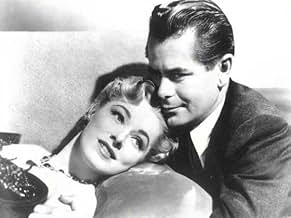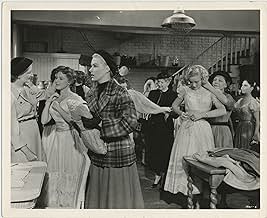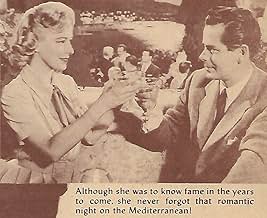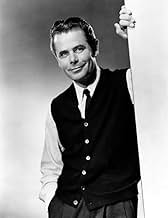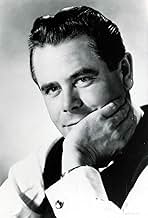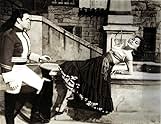CALIFICACIÓN DE IMDb
6.7/10
1.2 k
TU CALIFICACIÓN
Agrega una trama en tu idiomaThis movie chronicles Australian-born opera star Marjorie Lawrence's success, her battle with polio, and her eventual career comeback.This movie chronicles Australian-born opera star Marjorie Lawrence's success, her battle with polio, and her eventual career comeback.This movie chronicles Australian-born opera star Marjorie Lawrence's success, her battle with polio, and her eventual career comeback.
- Ganó 1 premio Óscar
- 1 premio ganado y 3 nominaciones en total
Phyllis Altivo
- Louise
- (sin créditos)
Benjie Bancroft
- Doctor
- (sin créditos)
Francis Barnes
- Singer
- (sin créditos)
Louise Bates
- Party Guest
- (sin créditos)
Mary Bayless
- Backstage Well-Wisher
- (sin créditos)
George Blagoi
- Audience Member
- (sin créditos)
Heinz Blankenburg
- Baritone
- (sin créditos)
Lulu Mae Bohrman
- Backstage Well-Wisher
- (sin créditos)
- Dirección
- Guionistas
- Todo el elenco y el equipo
- Producción, taquilla y más en IMDbPro
Argumento
¿Sabías que…?
- TriviaEleanor Parker can read music, and has perfect pitch as a singer. She decided to study the scores of the opera songs used in this movie on her own. She rented a cabin in Lake Arrowhead, California, and played the records while singing along, until she had the breathing and phrasing memorized. Then when filming the scenes, instead of lip-synching to the tracks recorded by Eileen Farrell for the movie, she sang full voice (but an octave lower). She is proud of the fact that they never had to do a re-take, in order to "match" the tapes. She nailed it on the first take every time.
- ErroresAfter Marjorie sings "Annie Laurie" and she wheels herself into the kitchen and she suggests a concert tour, right as she and Dr. King are embracing .
- Citas
Marjorie Lawrence: [drinking champagne] Tonight I love the whole world and I want them to know it.
Dr. Thomas King: And tomorrow you'll have a monumental hangover.
Marjorie Lawrence: That's the advantage of going out with doctors.
- ConexionesFeatured in 1955 Motion Picture Theatre Celebration (1955)
- Bandas sonorasDon Carlos
(1867) (uncredited)
Music by Giuseppe Verdi
Libretto by François Joseph Méry and Camille du Locle
Aria "O don fatale" Performed by Eleanor Parker (dubbed by Eileen Farrell) with piano accompaniment
Opinión destacada
Like others commenting on this film, I saw "Interrupted Melody" many years ago, and it left a deep impression on me. I found when watching it again that I had retained so many of the scenes in my memory.
"Interrupted Melody" tells the story of Australian soprano Marjorie Lawrence (played by Eleanor Parker), who was stricken with polio at the height of her career. The singer then has to find the courage to reclaim her will to live, her voice, and her career.
This is one of the few films, including anything of Lanza's, where entire arias and/or operatic scenes have been performed - and correctly. Singing for Ms. Parker is dramatic soprano Eileen Farrell, whose voice also acts. In the beginning, when the young Marjorie is in a vocal competition, Farrell takes her powerful chest voice out and instead carries her middle voice down to the low notes, giving the impression of a young, untrained singer. Truly inspired.
This has to be the high point of Eleanor Parker's career. I had a chance to see her nearly 30 years ago in a preview performance of "Pal Joey" - regretfully, there were many problems and she and her costar left the show before it opened. It was a shame, because Parker's Vera was wonderful. Here, she plays the young Marjorie with energy and determination, capturing the soprano's nervousness at being away from home when she goes to school in Monte Carlo. Later, she plays the perfect diva not afraid to state what she wants. Finally, she's the crippled Marjorie with no will to live, finding solace entertaining wounded soldiers who are worse off than she is. All through the film, she looks absolutely stunning, and her lipsyncing in Italian, French, and German is perfect.
The music is glorious - "Tristan und Isolde," "La Boheme," "Samson et Delilah," "Carmen," "Il Trovatore," (the fastest I've ever heard it), "Madama Butterfly," "Don Carlos," and "Gotterdammerung" - truly a feast for the ears with Eileen Farrell's magnificent singing.
Some have questioned whether or not Lawrence actually sang both mezzo and soprano roles. Lawrence did sing "Carmen," which can be sung by a dramatic soprano. Also, Lawrence probably started out as a mezzo - it was not until she trained in Paris that her upper range was extended. She sang Wagner, Strauss, Puccini, and Verdi in the big opera houses. "Samson and Delilah" was perhaps done for the film so we could see Eleanor Parker being sexy and seductive in a gauzy costume. The thing is, Lawrence's specialty was Wagner and you can't only have heavy Wagner scenes throughout a movie. The glamorous soprano did her own dancing in "Salome," and played the immolation scene in "Götterdämmerung" by riding her horse into the flames as Wagner had intended, making her one of the few, possibly the only, soprano to do this. She also did Thais, which calls for sex and beauty - "Thais" was the inspiration for the role Susan Kane bombed in during "Citizen Kane."
Glenn Ford plays Lawrence's husband, Dr. Thomas King, and the marriage of a successful opera star and fledgling pediatrician is realistically portrayed with all its difficulties. In real life, Tom King was an osteopath and a Christian Scientist. Ford has a background role much of the time, but also some very dramatic moments and some romantic ones. His gentle, easygoing style fit the character well. A very young Roger Moore is Marjorie's manager-brother.
If you love opera, or if you love a story of courage and the power of the human spirit, this film is for you. Have a box of tissues nearby - the ending is very powerful.
"Interrupted Melody" tells the story of Australian soprano Marjorie Lawrence (played by Eleanor Parker), who was stricken with polio at the height of her career. The singer then has to find the courage to reclaim her will to live, her voice, and her career.
This is one of the few films, including anything of Lanza's, where entire arias and/or operatic scenes have been performed - and correctly. Singing for Ms. Parker is dramatic soprano Eileen Farrell, whose voice also acts. In the beginning, when the young Marjorie is in a vocal competition, Farrell takes her powerful chest voice out and instead carries her middle voice down to the low notes, giving the impression of a young, untrained singer. Truly inspired.
This has to be the high point of Eleanor Parker's career. I had a chance to see her nearly 30 years ago in a preview performance of "Pal Joey" - regretfully, there were many problems and she and her costar left the show before it opened. It was a shame, because Parker's Vera was wonderful. Here, she plays the young Marjorie with energy and determination, capturing the soprano's nervousness at being away from home when she goes to school in Monte Carlo. Later, she plays the perfect diva not afraid to state what she wants. Finally, she's the crippled Marjorie with no will to live, finding solace entertaining wounded soldiers who are worse off than she is. All through the film, she looks absolutely stunning, and her lipsyncing in Italian, French, and German is perfect.
The music is glorious - "Tristan und Isolde," "La Boheme," "Samson et Delilah," "Carmen," "Il Trovatore," (the fastest I've ever heard it), "Madama Butterfly," "Don Carlos," and "Gotterdammerung" - truly a feast for the ears with Eileen Farrell's magnificent singing.
Some have questioned whether or not Lawrence actually sang both mezzo and soprano roles. Lawrence did sing "Carmen," which can be sung by a dramatic soprano. Also, Lawrence probably started out as a mezzo - it was not until she trained in Paris that her upper range was extended. She sang Wagner, Strauss, Puccini, and Verdi in the big opera houses. "Samson and Delilah" was perhaps done for the film so we could see Eleanor Parker being sexy and seductive in a gauzy costume. The thing is, Lawrence's specialty was Wagner and you can't only have heavy Wagner scenes throughout a movie. The glamorous soprano did her own dancing in "Salome," and played the immolation scene in "Götterdämmerung" by riding her horse into the flames as Wagner had intended, making her one of the few, possibly the only, soprano to do this. She also did Thais, which calls for sex and beauty - "Thais" was the inspiration for the role Susan Kane bombed in during "Citizen Kane."
Glenn Ford plays Lawrence's husband, Dr. Thomas King, and the marriage of a successful opera star and fledgling pediatrician is realistically portrayed with all its difficulties. In real life, Tom King was an osteopath and a Christian Scientist. Ford has a background role much of the time, but also some very dramatic moments and some romantic ones. His gentle, easygoing style fit the character well. A very young Roger Moore is Marjorie's manager-brother.
If you love opera, or if you love a story of courage and the power of the human spirit, this film is for you. Have a box of tissues nearby - the ending is very powerful.
- blanche-2
- 16 sep 2006
- Enlace permanente
Selecciones populares
Inicia sesión para calificar y agrega a la lista de videos para obtener recomendaciones personalizadas
- How long is Interrupted Melody?Con tecnología de Alexa
Detalles
Taquilla
- Presupuesto
- USD 2,367,000 (estimado)
- Tiempo de ejecución1 hora 46 minutos
- Relación de aspecto
- 2.55 : 1
Contribuir a esta página
Sugiere una edición o agrega el contenido que falta

Principales brechas de datos
By what name was Interrupted Melody (1955) officially released in India in English?
Responda


